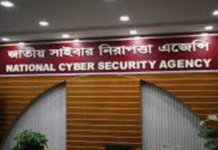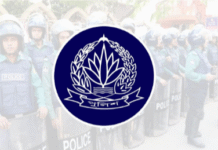 Election campaign posters hang on a street in Srinagar, Munshiganj district, Bangladesh, Nov. 5, 2021.
Election campaign posters hang on a street in Srinagar, Munshiganj district, Bangladesh, Nov. 5, 2021.
The Bangladesh Election Commission disqualified more than a quarter of candidates – predominantly independents running against the ruling Awami League – from contesting the upcoming general election, officials said.
The unprecedented disqualification rate of nearly 27% has prompted allegations that the commission is favoring the ruling party, although the main opposition BNP has already announced it is boycotting the polls scheduled for Jan. 7.
“Even before the Election Commission formally began scrutinizing nomination papers, it was already well-known that I would be disqualified,” Anwar Hossain, a prominent pro-Awami League academic running as an independent in northeastern Netrokona district, said on Tuesday.
“The fact that others already knew about my fate before the official decision was announced suggests that any sort of manipulation is possible.”
As many as 2,716 people initially filed paperwork to compete for 300 parliamentary seats. The commission declared 731 of them disqualified, among them only five candidates of the ruling Awami League party.
Because the opposition Bangladesh Nationalist Party and its partners are boycotting the election, the Awami League has permitted its members who didn’t receive formal party nominations to run as independent candidates, in an extraordinary move, which, analysts said, was meant to boost competitiveness and voter turnout.
Many of the disqualified independents are Awami League members themselves, but a BenarNews analysis of official data shows that the commission’s decisions disproportionately affected independents without any affiliation to the Awami League. As many as 210 out of 292 such independent candidates were declared ineligible to run for the parliamentary elections.
In next month’s vote, Prime Minister Sheikh Hasina is hoping that her party will win for a fourth consecutive term since 2009. Her party has refused to give in to BNP demands that the Awami League government resign to allow a neutral caretaker administration to oversee the election.
Mahbubar Rahman, a senior official at the election body, told reporters that most disqualifications resulted from the failure of candidates to validate the signatures of at least 1% of electors, ranging from 2,500 to 7,000 voters depending on the size of a constituency, as per the rules. Other reasons cited include having defaulted on a bank loan and possessing dual citizenship.
He said the commission had scrutinized candidates’ paperwork through a random sampling process and manually matched the voters’ signatures submitted by candidates with its own database to make decisions.
The disqualified candidates now have until Dec. 9 to appeal the decision, which the commission will settle by Dec. 15.
‘Errors in signatures’
In 2008, Bangladesh started to require independent candidates to submit written support from at least 1% of electors in their constituency to run in the parliamentary election.
This rule dramatically increased the disqualification rate fivefold from 4.37% in the previous election of 2001.
Some independent candidates whom BenarNews spoke to alleged that the rule was selectively enforced without adequate time to respond.
“We have submitted a list of endorsers totaling one percent of my constituency’s total voters,” Anwar Hossain told BenarNews. “Our list had at least 100 more signatures than required.”
“So the official explanation that I was made ineligible because of errors in the list seemed laughable to me,” he added.
Shafi Ahmed, another independent candidate running in a separate seat in Netrokona, told BenarNews that the Commission cited two instances of signature mismatches to disqualify him.
“We don’t know which signatures the Commission referred to,” he said. “If the Commission informed us beforehand, we could have presented our endorsers in person.”
“This is nothing but nitpicking and manipulation.”
He also said the rule requiring voter endorsements contradicted the constitutional provision of secret balloting.
“If more than 3,000 voters are required to publicly endorse a candidate, it’s not secret anymore,” he said.
On Monday, a lawyer filed a petition with Bangladesh’s High Court challenging the legality of the requirement.
“The rule is contradictory to the electoral rights enshrined in the constitution. The rule needs to be removed so that independent candidates can contest in an election without any hassle,” Yusuf Ali, the petitioner, told BenarNews.
Some disqualified candidates blame their rivals in the ruling party for their misfortune.
Firozur Rahman, who resigned from his position as a council chairman in Brahmanbaria, an eastern district, to contest in the parliamentary election, told BenarNews, “We have been told that one of my endorsers’ signature didn’t match with official database, so my candidacy was declared invalid.”
“That endorser had been abducted by the supporters of the incumbent member of Parliament, so he could not testify before a magistrate in person,” Rahman, also a member of the ruling party, said.
R.A.M. Obaidul Muktadir Chowdhury, an incumbent MP who is running for re-election on the Awami League’s ticket, strongly denied the allegations.
“The person alleged to have been abducted spoke to the police and the local administration and said the signature was not his. If it indeed was his signature, the candidate should be able to prove it during the appeal process.”










